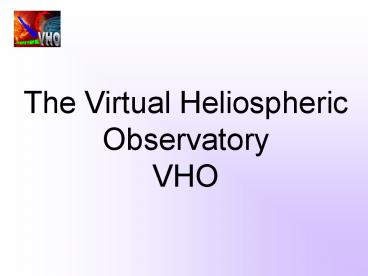The Virtual Heliospheric Observatory VHO - PowerPoint PPT Presentation
Title:
The Virtual Heliospheric Observatory VHO
Description:
... is dynamic as new data products and services will ... Registry Metadata Data service information ... The VHO team will assist data providers in the one-time ... – PowerPoint PPT presentation
Number of Views:79
Avg rating:3.0/5.0
Title: The Virtual Heliospheric Observatory VHO
1
The Virtual HeliosphericObservatoryVHO
2
The VHO Team
Adam Szabo (lead) NASA/GSFC Andrew
Davis Caltech George Ho JHU/APL Justin
Kasper MIT Jan Merka U. Maryland, Baltimore
County Thomas Narock L3 Communications Jim
Raines U. Michigan Kathryn Rash NASA/GSFC D.
Aaron Roberts NASA/GSFC Peter Schroeder U.
California, Berkeley Jon Vandegriff JHU/APL Coll
aborators Paul Gazis SETI Institute Richard
Keller NASA/ARC Neal Hurlburt Lockheed Martin
SAL Shawn Wolfe NASA/ARC
Team membership is dynamic as new data products
and services will be added.
3
(No Transcript)
4
VHO Services
- No data flow through the VHO middleware! Our
Role Connecting data to independent
services. Enable services not develop them
ourselves. - Ability to search for services
- Metadata of service description
- Ability to search for data related IDL routines
(HelioSoft) - Metadata of routines
- Mission independent VHO Data Environment
5
VHO Architecture
- Lightweight middleware with search capability.
- Common metadata description of products and
services based on SPASE dictionary. - Data exchange and synchronization mechanism.
- Minimum possible requirements on data providers.
- Low cost extensible system deployed in phases.
6
VHO Development Phases (1)L1 Data Environment
- L1 data sets made web accessible.
- Data products described in SPASE compliant
metadata format. - Data exchange synchronization established
between data providers.
7
VHO Development Phases (2)Basic VHO
- Middleware with both Web and API user
interfaces. - All middleware static and dynamic metadata
products developed. - Public access to software tools with
metadata.
8
VHO Metadata
- Static Metadata (requiring no or infrequent
updates) - Product Metadata Complete description of data
content. - Registry Metadata Data service information
- Service Metadata Complete description of
added-value
data processing services. - VHO Metadata WSDL description of VHO
functionality.
- Dynamic Metadata (requiring daily updates)
- Availability Current range of available data.
- Software Current list of available software
tools.
9
VHO Web Interface
Data can be searched for by the following ways
- Time
- Date/Time
- Bartel/Carrington Rot.
- S/C Location
- GSE/GSM/HGI coord.
- Region name
- Measurement Type
- e.g., magnetic field, thermal plasma,
energetic particles
Selecttime period
Selectregion of interest
Optionallyrefine S/Cselection
10
VHO API
The VHO API will allow access to all VHO
functions.
- IDL VM Demo software
- Library
- Perl
- Java
- CoSEC
- IDL (soon)
11
VHO Development Phases (3)Full VHO
- Connection to processing services.
- Connection to other VxOs
12
Community Input
- Large, diverse and dynamic team membership.
- Submit recommendations via our web
page http//vho.nasa.gov - Ask users to prioritize upcoming feature
additions. - Web statistics
- Bi-annual VHO meetings at AGU conferences.
13
VxO Interaction
- Our first focus will be on interacting with VSO.
- Will not attempt to recreate full VSO web
interface. Rather, a heliosphere centric view
will be provided. API will have access to most
VSO capabilities. - WSDL description of VHO services.
- Passing dynamic metadata between VxOs would
allow the execution of complex queries.
14
BACKUP
15
Data Provider Requirements
- The VHO is designed to minimize requirements on
data providers. The VHO will work with any
currently available data formats or services. - The VHO team will assist data providers in the
one-time generation of the detailed product
metadata. - Data providers will have to allow access to
their products. The preferred mechanism will be
via the VHO team provided SOAP interface for
local queries. But implementing this SOAP
interface will not be mendatory. - Data providers will have to allow the VHO
synchronization routines to run on their
machine providing metadata updates.
16
Data Exchange Synchronization
Synchronized copy of data from similar instrument
used to improve calibration.
Synchronized copies of various other data
products used to generate merged or added value
new product.































